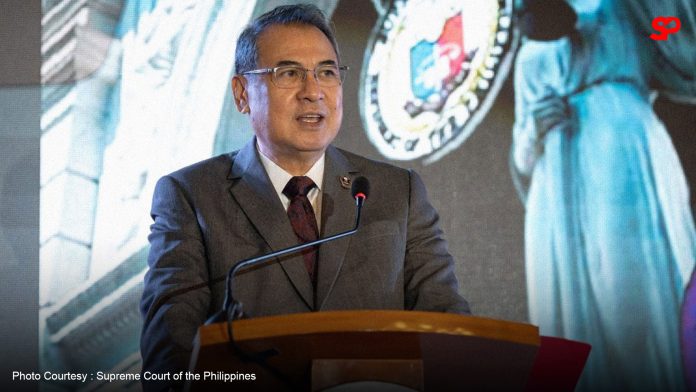MANILA – Chief Justice Alexander Gesmundo on Thursday assured that the Judiciary is committed to uplift environmental law and legal practice toward effective environmental and climate action.
Speaking before the National Summit on Sustainability and Environmental Law in Puerto Princesa, Palawan, Gesmundo said the Philippines has worked hard to address environmental harm and tackle the climate crisis.
“The judiciary has likewise played its role in this regard, fully aware of its duty to protect the rights of our people, especially the fundamental right to a balanced and healthful ecology, as enshrined in our constitution. This responsibility has guided the Court in tackling key cases that have come before us, resulting in landmark rulings for environmental protection and climate action,” he said.
“We have also endeavored to ensure that our rules and procedures evolve not only to keep pace with the development of the science on climate and the environment, but also with the changing needs of our people in this regard,” Gesmundo added.
He cited the Rules of Procedure for Environmental Cases issued by the Supreme Court in 2010 which provided a simplified, speedy and inexpensive procedure for the enforcement of environmental rights and duties.
“This, notably, also introduced the special Writ of Kalikasan (Nature), as well as provided the specific requirements for the issuance of a writ of continuing mandamus,” he said.
For sustainability, the Chief Justice cited efforts toward electronic courts which has, among others, significantly reduced paper waste from court filings.
Other efforts include the issuance of a memorandum discouraging the use of single-use plastics and encouraging alternatives; and the creation of the Judicial Committee on Sustainability and Environmental Concerns.
He noted that the summit’s goal is to uplift the law and legal practice toward effective environmental and climate action by listening to different proposals and suggestions of a wide range of stakeholders, from practitioners to judges and even from the business sector.
“This underscores not just our unified approach to climate action in the judiciary, but our determination to ensure that our proposed solutions and revisions accurately reflect and respond to the needs of and challenges faced by those on the ground, especially the most vulnerable,” Gesmundo said.
“I want to emphasize the critical choice ahead for us in the judiciary. It is no longer a question of whether we must uplift environmental law and legal practice toward effective environmental and climate action. I assure you, the judiciary is already deeply committed to that cause.”
The National Summit on Sustainability and Environmental Law, which runs from November 27 to 30, aims to amend the Rules of Procedure in Environmental Cases toward enabling effective, responsive and sustainable legal processes and remedies.
It brings together different stakeholders to discuss current environmental problems in the Philippines and how these may be mitigated by legal practitioners and institutions. (PNA)

